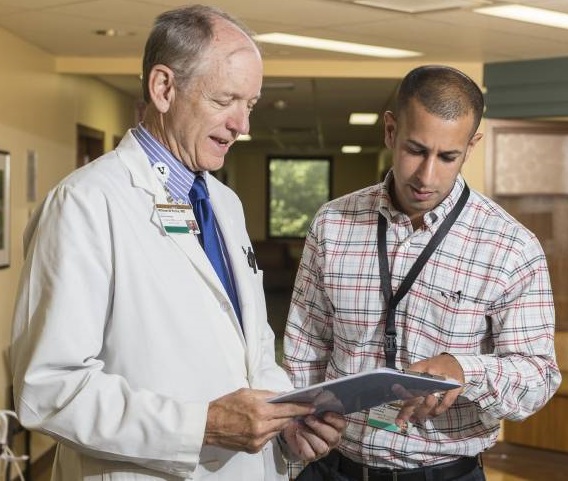Vanderbilt Neuroscience Graduate Program
Graduate students who perform their dissertation studies or rotate in the Center for Cognitive Medicine learn and utilize cutting-edge techniques that are useful in clinical neuroscience research. These include experimental human neuropharmacology, experimental cognitive and neuropsychological measurements, conducting clinical assessment, and advanced human neuroimaging procedures and analytical approaches such as functional and structural magnetic resonance imaging (MRI), positron emission tomography (PET) and electroencephalography (EEG) studies. Graduate students also learn how to process and analyze multimodal human data, combining behavioral, physiological, cognitive, fluid biomarker, and imaging data and how to interpret these findings in the wider context of a clinical neuroscience research project. The graduate students who have rotated in the Center for Cognitive Medicine have the opportunity to design dissertation studies focusing on a variety of topics in human clinical neuroscience and become important members of the Center’s team. Previous PhD students and postdoctoral fellows have studied diverse topics such as sex differences in brain function in aging, effects of cancer chemotherapy on brain function, the integrity of brain cholinergic systems in chronic HIV infection, brain changes in late-life depression, and drug development for Alzheimer’s disease.
Vanderbilt Undergraduate Interdisciplinary Program
in Neuroscience
Undergraduate students who volunteer or work for course credit in the Center for Cognitive Medicine learn about experimental design and laboratory techniques that are used to measure treatment effects on brain function or a particular cognitive process. These include experimental human neuropharmacology, experimental cognitive and neuropsychological measurements, conducting clinical assessment, and advanced human neuroimaging procedures and analytical approaches such as functional and structural magnetic resonance imaging (MRI), positron emission tomography (PET) and electroencephalography (EEG) studies. In addition, undergraduate students learn how to administer some of the cognitive screening and performance instruments that are used in the clinical research studies. Undergraduate may also be involved in the preparation of study visits or the processing of data.
The Newhouse Lab is accepting new undergrad students.
Vanderbilt Geriatric Psychiatry Fellowship
The Vanderbilt Geriatric Psychiatry Fellowship
Program is a joint effort between the Vanderbilt University Department of Psychiatry and the Tennessee Valley Healthcare Systems VA Hospitals.
The Fellowship is designed to provide a 12-month intensive training experience to be taken after the initial 4 years of General Psychiatry training. The program prepares trainees for clinical and academic leadership in the field of Geriatric Psychiatry and for the certification examination for Added Qualifications in Geriatric Psychiatry by the American Board of Psychiatry and Neurology.